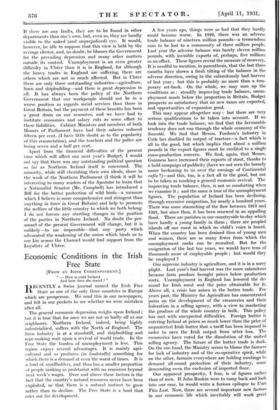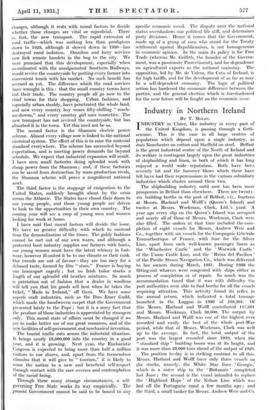Economic Conditions in the Irish Free State
FROM AN IRISH CORRESPONDENT.]
" - How is ould Ireland
And how does she stand ? "
RECENTLY a Swiss journal named the Irish Free State as one of the only three countries in Europe which are prosperous. We read this in our newspapers,' and felt in our pockets to see whether we were mistaken after all.
The general economic depression weighs upon Ireland ; but it is true that for once we are not so badly off as our neighbours. Northern Ireland, indeed, being highly industrialized, suffers with the North of England. The linen industry is at a standstill, and shipbuilding and rope-making wait upon a revival of world trade. In the Free State the burden of unemployment is less. This region enjoys several advantages. It is mainly agri- cultural and so produces (in foodstuffs) something for which there is a demand at even the worst of times. It is a land of smallholders, and thus has a smaller proportion of people ranking as proletariat with no resources beyond next week's wages. Over and above these factors is the fact that the country's natural resources never have been exploited, so that there is a natural instinct to grow rather than to decline. The Free State is a land that cries out for development. A few years ago, things were so bad that they hardly could become worse. In 1926, there was an adverse trade balance of nineteen million pounds—a tremendous sum to be lost to a community of three million people. Last year the adverse balance was barely eleven million pounds, with invisible exports of, perhaps, five millions as an offset. These figures reveal the measure of recovery. It is needful to mention, in parenthesis, that the last three months have shown a fresh tilting of the balance in the adverse direction, owing to the calamitously bad harvest of last year ; but this is probably no more than a tem- porary set-back. On the whole, we may sum up the conditions as : steadily improving trade balance, unem- ployment much below the proportion in Britain, Budget prospects so satisfactory that no new taxes are expected, and opportunities of expansion good.
This may appear altogether rosy : but there are very serious qualifications to be taken into account. If we look into the trade balance, we find that the favourable tendency does not run through the whole economy of the Saorshit. We find that Messrs. Fordson's industry in Cork has doubled its output of tractors—a fact which is all to the good, but which implies that about a million pounds in the export figures must be credited to a single mass-production concern. We find, again, that Messrs. Guinness have increased their exports of stout, thanks to a bold campaign of publicity (have we not seen the homely name beckoning to us over the awnings of Continental cafes ?)—and this, too, is a fact all to the good, but not to be taken as marking a general economic revival. The improving trade balance, then, is not so comforting when we examine it ; and the same is true of the unemployment figures. The population of Ireland has been declining, through excessive emigration, for nearly a hundred years. There was some staunching of the flow between 1911 and 1921, but since then, it has been renewed in an appalling flood. There are parishes in our countryside to-day which have hardly a young family in them ; there are peopled islands off our coast in which no child's voice is heard. When the country hai been drained thus of young men and women, there are so many fewer from which the unemployment ranks can be recruited. But for the emigration of the last ten years, we would have tens of thousands more of employable people ; but would they be employed ?
Our supreme industry is agriculture, and it is in a sorry plight. Last year's bad harvest was the more calamitous because farm produce brought prices below production casts. Unemployment in England has lowered the de- mand for Irish meat and the price obtainable for it.
Above all, a crisis has arisen in the butter trade. For Years past, the Ministry far Agriculture has concentrated pains on the development of the creameries and their federation in a selling agency, with a view to marketing the produce of the whole country in bulk. This policy has met with unexpected difficulties. Foreign butter is entering Ireland at prices so much lower than the price of unprotected Irish butter that a tariff has been imposed in order to save the Irish output from utter loss. The creameries have voted for the dissolution of the united selling agency. The future of the butter trade is dark. On the one hand, the Ministry seems to.blame the farmers for lack of industry and of the co-operative spirit, while on the other, farmers everywhere are holding meetings to demand all-round protection of their industry, some demanding even the exclusion of imported flour.
Our apparent prosperity, I fear, is of figUres rather than of men. If John Ruskin were to come back and look into our case, he would write a furious epilogue to Unto This Last. Now, there are several important new factors in our economic life which inevitably will work great changes, although it rests with moral factors to decide whether those changes are vital or superficial. There is, first, the new transport. The rapid extension of road traffic—which was nothing less than prodigious down to 1929, although it slowed down in 1930—has destroyed rural isolation. Omnibus and lorry services now link remote hamlets in the bog to the city. We were promised that this development, especially when co-ordinated with the amalgamated Southern Railways, would revive the countryside by putting every farmer into convenient touch with his market. No such benefit has accrued as yet. The difference which the road services have wrought is this that the small country towns have lost their trade. The country people all go now to the chief towns for their shopping. Urban fashions, and especially urban shoddy, have penetrated the whole land, and now every country boy wears fifty-shilling " reach- me-downs," and every country girl uses cosmetics. The new transport has. not revived the countryside, but has absorbed it in the town. ,Yet this need not be so: The second factor is the Shannon electric power scheme. Almost every village now is linked to the national electrical system. The effect of this is to raise the material standard everywhere. The scheme has succeeded beyond expectation, and is meeting power demands far beyond schedule. We expect that industrial expansion will result. I have seen small factories doing splendid work with cheap power from the Shannon ; and, if these factories can be saved from destruction by mass-production rivals, the Shannon scheme will prove a magnificent national asset.
The third factor is the stoppage of emigiation to the United States, suddenly brought about by the crisis across the Atlantic. The States have closed their doors to our young people, and those young people are driven to look to the opportunities in their own country. The coming year will see a crop of young men and women looking for work at home.
I have said that moral factors will decide the issue. We have no greater difficulty with which to contend than the demoralization of the times. The giddy fashions cannot be met out of our own wares, and although a protected boot industry supplies our farmers with boots, our young women must have the latest whimsy in foot- wear, however ill-suited it be to our climate or their rank. Our tweeds are out of favour—they are too racy for a debased taste, formed by film " stars." France is buying our homespun eagerly ; but no Irish tailor stocks a length of our splendid old heather mixtures. So much is patriotism out of fashion that a dealer in woollens will tell you that his goods sell best when he takes the ticket, " Made in Ireland," off them. We have some superb craft industries, such as the Dun Emer Guild, which made the handwoven carpet that the Govermnent presented lately to the Pope ; but it is a sorry fact that the prodUce of those industries is appreciated by strangers only. This moral state of affairs must be changed if we are to make better use of our great resources, and of the new facilities of self-government and mechanical invention.
The tourist traffic cuts across the industrial situation. It brings nearly 13,000,000 into the country in a good year, and it is. growing. Neit year, the Eucharistic Congress is expected to bring more than half a million visitors to our shores, and, apart from the tremendouS stimulus that it will give 'to " tourism," it is likely to rouse the nation to a new and beneficial self-respect through contact with the race oversea and contemplation of the racial being.
Through these many Strange circumstances, a self- . goyerning Free State works its way empirically. The present Government cannot be said to be bound to any specific economic creed. The dispute over the national status overshadows our political life still, and determines party divisions. Hence it comes that the Government, made up of a group of men who stand for the Treaty settlement against Republicanism, is not homogeneous in economic opinion. In the main its policy is for Free Trade (whereas Mr. Griffith, the founder of the Govern- ment, was a passionate Protectionist), and for dependence on agricultural exports as the national mainstay. The opposition, led by Mr. de Valera, the Cato of Ireland, is for high tariffs, and for the development of as far as may be a self-dependent economy. The logic of political action has hardened the economic difference between the parties, and the general election Which is foreshadowed for the near future will be fought on the economic issue.











































 Previous page
Previous page